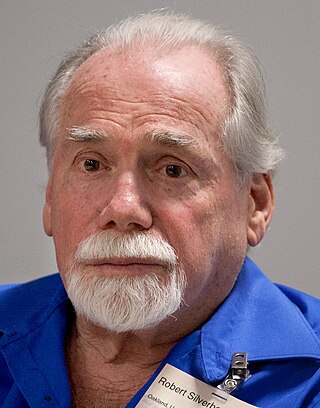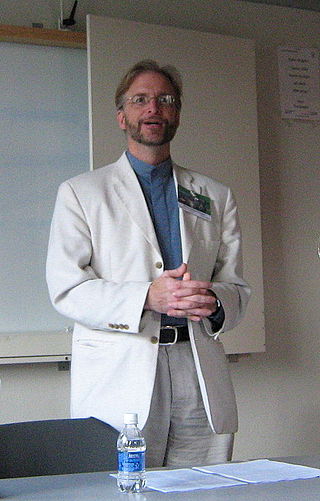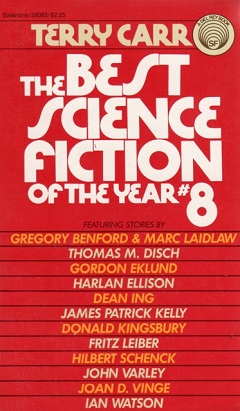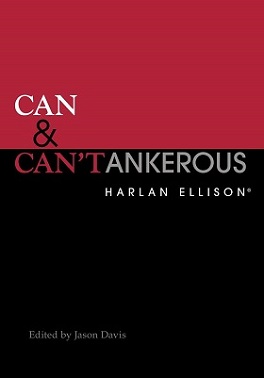
Brian Wilson Aldiss was an English writer, artist and anthology editor, best known for science fiction novels and short stories. His byline reads either Brian W. Aldiss or simply Brian Aldiss, except for occasional pseudonyms during the mid-1960s.

George Raymond Richard Martin, also known as GRRM, is an American novelist, screenwriter, television producer and short story writer. He is the author of the series of epic fantasy novels A Song of Ice and Fire, which were adapted into the Emmy Award-winning HBO series Game of Thrones (2011–2019) and its prequel series House of the Dragon (2022–present). He also helped create the Wild Cards anthology series, and contributed worldbuilding for the 2022 The Game Award for Game of the Year winner Elden Ring.

Alice Bradley Sheldon was an American science fiction and fantasy author better known as James Tiptree Jr., a pen name she used from 1967 until her death. It was not publicly known until 1977 that James Tiptree Jr. was a woman. From 1974 to 1985 she also occasionally used the pen name Raccoona Sheldon. Tiptree was inducted into the Science Fiction Hall of Fame in 2012.

A novella is a narrative prose fiction whose length is shorter than most novels, but longer than most short stories. The English word novella derives from the Italian novella meaning a short story related to true facts.

Robert Silverberg is an American author and editor, best known for writing science fiction. He is a multiple winner of both Hugo and Nebula Awards, a member of the Science Fiction and Fantasy Hall of Fame, and a Grand Master of SF. He has attended every Hugo Award ceremony since the inaugural event in 1953.

Bruce Holland Rogers is an American author of short fiction who also writes under the pseudonym Hanovi Braddock. His stories have won a Pushcart Prize, two Nebula Awards, the Bram Stoker Award, two World Fantasy Awards, the Micro Award, and have been nominated for the Edgar Allan Poe Award and Spain's Premio Ignotus.

The Ship Who Sang (1969) is a science fiction novel by American writer Anne McCaffrey, a fix-up of five stories published 1961 to 1969. It is also the title of the 1961 novelette which is the first of these stories. The series started by the book, the "Brain & Brawn Ship series", is sometimes called the "Ship Who Sang series".

Joseph Hillström King, better known by the pen name Joe Hill, is an American writer. His work includes the novels Heart-Shaped Box (2007), Horns (2010), NOS4A2 (2013), and The Fireman (2016); the short story collections 20th Century Ghosts (2005) and Strange Weather (2017); and the comic book series Locke & Key (2008–2013). He has won awards including Bram Stoker Awards, British Fantasy Awards, and an Eisner Award.

The Science Fiction Hall of Fame, Volume Two is an English language science fiction two-volume anthology edited by Ben Bova and published in the U.S. by Doubleday in 1973, distinguished as volumes "Two A" and "Two B". In the U.K. they were published by Gollancz as Volume Two (1973) and Volume Three (1974). The original U.S. subtitle was The Greatest Science Fiction Novellas of All Time.
The Paul Harland Prize is the oldest annual award for original Dutch short science fiction, fantasy or horror stories. It is named after Dutch science fiction author Paul Harland, who died in 2003.

The Best Science Fiction of the Year #8 is an anthology of science fiction short stories edited by Terry Carr, the eighth volume in a series of sixteen. It was first published in paperback by Del Rey Books in July 1979, and in hardcover by the same publisher in conjunction with the Science Fiction Book Club in August 1979. The first British edition was issued by Gollancz in the same year.

Can & Can'tankerous is a 2015 collection of previously uncollected short stories written by Harlan Ellison. The collection includes the story "How Interesting: A Tiny Man", which won the 2011 Nebula Award for Best Short Story alongside "Ponies" by Kij Johnson. The collection was edited by Jason Davis and includes an introduction to the story "Loose Cannon" written by Neil Gaiman.

Nebula Award Stories 7 is an anthology of award-winning science fiction short works edited by Lloyd Biggle, Jr. It was first published in the United Kingdom in hardcover by Gollancz in November 1972. The first American edition was published by Harper & Row in January 1973; a Science Fiction Book Club edition, also in hardcover, followed in March of the same year. Paperback editions followed from Harrow Books in the U.S. in 1973, and Panther in the U.K. in December 1974. The American editions bore the variant title Nebula Award Stories Seven. The book has also been published in German.

Nebula Awards 32 is an anthology of science fiction short works edited by Jack Dann. It was first published in hardcover and trade paperback by Harcourt Brace in April 1998.

Nebula Award Stories 1965 is an anthology of science fiction short works edited by Damon Knight. It was first published in hardcover by Doubleday in 1966, with a Science Fiction Book Club edition following in October of the same year. The first British edition was published by Gollancz in 1967. Paperback editions followed from Pocket Books in the U.S. in November 1967, and New English Library in the U.K. in April 1969. The U.K. and paperback editions bore the variant title Nebula Award Stories 1. The book was more recently reissued by Stealth Press in hardcover in February 2001. It has also been published in German.

Brooke Bolander is an American author of speculative fiction.

Nebula Awards Showcase 2019 is an anthology of science fiction and fantasy short works edited by Mexican-Canadian writer Silvia Moreno-Garcia, first published in trade paperback and ebook by Parvus Press in October 2019.
"The Diary of the Rose" is a 1976 dystopian science fiction novelette by Ursula K. Le Guin, first published in the Future Power collection. The tale is set in a totalitarian society which uses brainwashing by "electroshocks" to eradicate any kind of political dissent.















